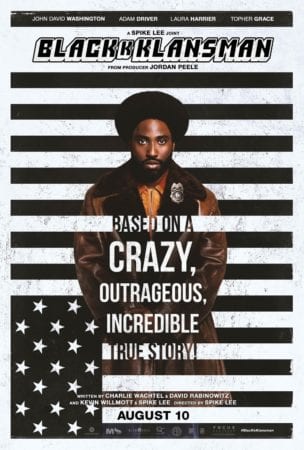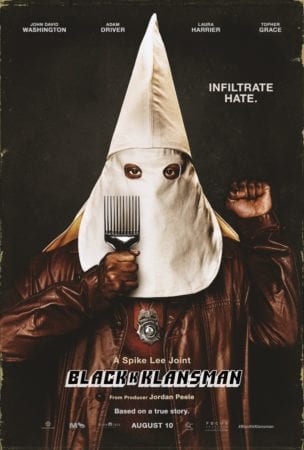BLACKKKLANSMAN REVIEWED
The advance screening of Spike Lee’s BlackkKlansman that I attended landed a few days shy of the first anniversary of the earth shattering events that unfolded in Charlottesville, Virginia in August of 2017. This is a fact that the film is almost all too aware of, even resorting to the use of archival footage from those events that left Heather Heyer, a counter-protester against a White Supremacist Rally, lying in a pool of her own blood.
That’s how the film ends because of course we know how it ends: it’s 2018 and we are living through a truly cruel timeline.
Our protagonist Ron Stallworth (John David Washington) muses with a fellow officer over the feasibility of KKK Grand Wizard/National Director David Duke (Topher Grace) seeking political office. Duke wears the finest suits, is mild mannered and oozes the type of milquetoast charm that could easily give him traction in an election. Since the film is set in the mid-1970’s, neither of the characters know that Duke will indeed seek office or being involved in aforementioned tragedy at Charlottesville.
Stallworth, a rookie cop, indeed the first African American officer on the Colorado Springs police force has somehow managed to infiltrate the local KKK branch via happenstance. With the assistance of fellow undercover office Flip Zimmerman (Adam Driver) digs deeper into the inner workings of the Klan. Flip, a non-practicing Jewish man, presents himself in person to the local Klan chapter as Ron Stallworth while the real Ron engages with the leadership of the clan on the phone using his “white voice” (more on this to come). In a recent interview, Washington referred to the film’s premise as something out of a Chappelle’s Show sketch.
In one scene, Felix (in an intense performance by Jasper Pääkkönen) locks Flip in a cellar, suspicious of Flip/Ron’s heritage and intentions. Felix demands to see Flip’s penis, presumably to see if he’s circumcised. During the heated exchange, Felix notes that he thinks the Holocaust was a hoax perpetrated by the Jewish people, trying to elicit a response from Flip. Flip, chillingly, retorts with “Why deny it? It was beautiful?”
The film unfolds mainly as a buddy comedy as the real Ron becomes a confidant of David Duke and as Ron and Flip discover that the Klan is plotting an attack on the local Black Student’s Union. In some ways, it feels like a genre exercise, like Lee’s Inside Man. Yet on Stallworth’s story, Lee has found the ideal vehicle to serve as a freewheeling platform to discuss a myriad of issues from police violence, institutional racism, to the ever-persistent conversation about the nature of protest and solidarity within the black community,
Early in the film, Stallworth is assigned to infiltrate a meeting that’s being headlined by guest speaker, Kwame Ture, formerly known as Stokley Carmichael. His superiors worry that Ture, an ex-leader within the Black Panthers, will agitate the local black community. Stallworth takes the assignment and runs with it. He meets Patrice Dumas (Laura Harrier) , the leader of the Black Student Union chapter at UCCS. Their chemistry palpable, nevertheless, the relationship is weighed down because Ron is afraid to admit that he’s an undercover member of the police force. To Patrice, he’s a collaborator. Ron sincerely believes that he can bring change within the department by bringing incremental change via representation.
Kwame Ture (in an electrifying performance by Corey Hawkins), believes a revolution is coming. That every black man should be willing to arm himself and be ready to attain their rights via force. There’s a variety of world views thrown at the viewer rather quickly. Lee doesn’t immediately identify with one of the other, but he gives equal credence to each view. The tension in these divides is the soul of the film. And yet the real key to the movie is later on in Ture’s speech.
He talks of black love. Of not accepting traditionally white, Anglo Saxon conceptions of beauty. He wants his audience to appreciate their wider noses, their fuller lips, their coarse hair. Black is beautiful, after all. And intercut between Ture’s intense oration are shots of the audience, entranced, sitting in a dark room. Occasionally, we’ll only see the faces of some of the folks in the crowd, seemingly separated from their bodies, listening in solidarity, hoping for something. Something better, something more. In one minor scene, Ron asks Flip why he doesn’t seem that invested in the case. Flip, after all, is Jewish. “You’ve got skin in the game, too,” Ron notes. Flip mentions that he never even had a Batmitpha, that he never connected with his heritage, that he simply passed as white.
The opening scene of the film aims for the jugular: a breakdown of the narrative of Southern gallantry, that “lost cause,” mentality that led to the birth of the Klu Klux Klan. Lee excerpts the famous crane shot from Gone with the Wind of Scarlett O’Hara wading through scores of Confederate casualties, and then cuts to a faux-propaganda reel (hosted by Alec Baldwin in a cameo) that espouses the most hateful ideology imaginable. We as the audience laugh and cringe simultaneously.
FILM STATS
- 2 hrs and 8 mins
- R
- Focus Features

